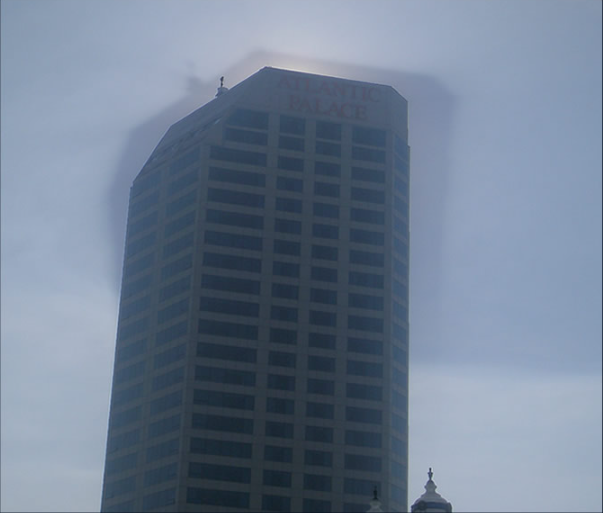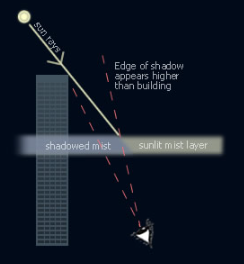Atlantic City Shadows
Atlantic City Shadows: A Fascinating Optical Phenomenon
Have you ever looked up at a building and noticed that its shadow appears larger or distorted? If you've ever been to Atlantic City, New Jersey, you may have experienced this intriguing optical illusion firsthand. In this article, we will explore the phenomenon of Atlantic City shadows and delve into the science behind their peculiar appearance.
The Mysterious Shadows of Atlantic City
One striking example of Atlantic City shadows was captured in an image by Erika Valdueza in June 2008. The photograph reveals an odd sight - the shadow of a helicopter hovering over a building, seemingly larger than the actual aircraft itself. Similarly, the shadow cast by the building appears taller and wider than the structure itself. How can this be?
The Role of Perspective
The explanation lies in the concept of perspective. When shadows are cast by objects under near-parallel sunlight into a layer of mist lower down the building, they can appear larger and distorted to the observer. This phenomenon occurs because the shadows are closer to the eye and camera, creating an illusion of increased size.
Understanding Atmospheric Optics
To truly grasp the intricacies of Atlantic City shadows, we must delve into the realm of atmospheric optics. This field of study focuses on the behavior of light as it interacts with various atmospheric conditions, such as mist, fog, and other particles suspended in the air.
The Science Behind the Illusion
When sunlight passes through a layer of mist, it undergoes a process known as scattering. This scattering causes the light rays to deviate from their original path and scatter in different directions. As a result, the shadows cast by objects in the misty atmosphere can become elongated and appear larger than the objects themselves.
Exploring Other Atmospheric Optics Phenomena
Atlantic City shadows are just one example of the captivating phenomena that occur in our atmosphere. Here are a few other notable atmospheric optics phenomena that you may encounter:
- Rainbows: These beautiful arcs of colors form when sunlight is refracted, reflected, and dispersed by water droplets in the air.
- Halos: Circular rings of light that appear around the sun or moon due to the refraction and reflection of light by ice crystals in the atmosphere.
- Mirages: Optical illusions that occur when light rays are bent as they pass through layers of air with different temperatures, creating distorted images of distant objects.
Capturing the Beauty of Atmospheric Optics
Photographers and enthusiasts alike are often captivated by the stunning visuals created by atmospheric optics phenomena. From rainbow-filled skies to ethereal halos, these natural wonders offer endless opportunities for artistic expression and scientific exploration.
Embracing the Wonder of Nature
The study of atmospheric optics reminds us of the remarkable complexity and beauty of our natural world. By observing and understanding these phenomena, we gain a deeper appreciation for the intricate interplay between light, particles, and the atmosphere.
Unveiling the Secrets of Atlantic City Shadows
Next time you find yourself in Atlantic City, take a moment to look up and observe the mesmerizing shadows cast by the buildings. Appreciate the way they appear larger and distorted due to the misty atmosphere. As you marvel at this optical illusion, remember that there is always more to discover about the mysteries that lie hidden within our everyday surroundings.
So, embrace the wonder of Atlantic City shadows and allow yourself to be captivated by the enchanting world of atmospheric optics.

Mist Shadow imaged by Erika Valdueza in Atlantic City, New Jersey June '08.
Image ©Erika Valdueza, shown with permission.
There are several odd looking features. The shadow looks higher and wider than the building. The shadow helicopter appears to overhang the building more than the real 'copter.
It's all due to perspective. The shadows are cast by near parallel sun rays into a layer of mist lower down the building. The shadows are the same size as the objects casting them but appear larger because they are closer to the eye and camera.

Note: this article has been automatically converted from the old site and may not appear as intended. You can find the original article here.
Reference Atmospheric Optics
If you use any of the definitions, information, or data presented on Atmospheric Optics, please copy the link or reference below to properly credit us as the reference source. Thank you!
-
<a href="https://atoptics.co.uk/blog/atlantic-city-shadows/">Atlantic City Shadows</a>
-
"Atlantic City Shadows". Atmospheric Optics. Accessed on November 26, 2024. https://atoptics.co.uk/blog/atlantic-city-shadows/.
-
"Atlantic City Shadows". Atmospheric Optics, https://atoptics.co.uk/blog/atlantic-city-shadows/. Accessed 26 November, 2024
-
Atlantic City Shadows. Atmospheric Optics. Retrieved from https://atoptics.co.uk/blog/atlantic-city-shadows/.